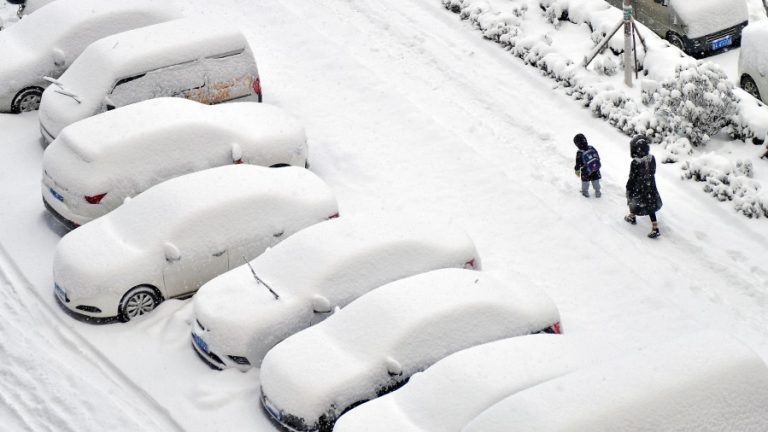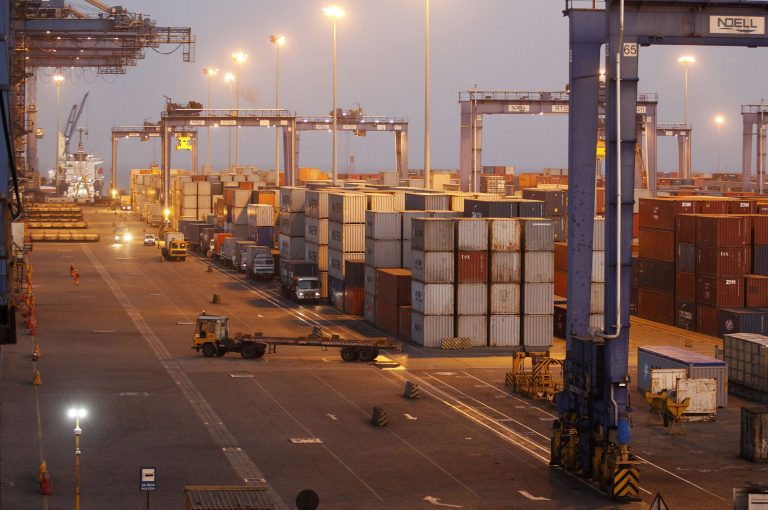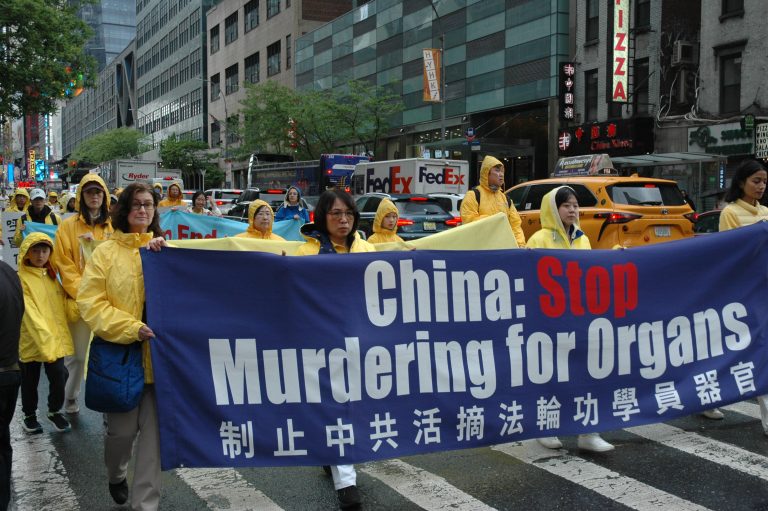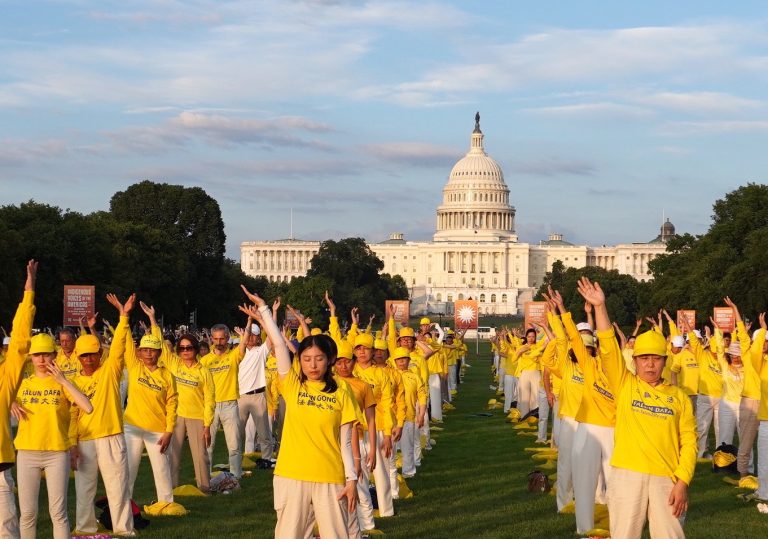By Li Muzi, Vision Times Staff
A spell of unusually cold weather has swept across China over the last two weeks, with temperatures falling rapidly at the end of January starting in the arid northwest and moving south. By Feb. 1, heavy snow and blizzards had affected 12 provinces, leading to mass-closures of highways and public transit, as well as pileup accidents at a time when millions of people are making their annual Chinese New Year trips to visit relatives or go on vacation.
The snowstorms are the worst China has seen since 2009. Particularly hard-hit are the central Chinese provinces of Henan and Hubei, which count a combined population of around 150 million people. This area rarely sees such heavy snow, leaving residents and authorities alike unprepared for severe winter storms.
Snow depths at more than 50 sites in Hubei, Anhui, and Henan have broken records for the same period in past years. As it is currently the peak of the Chinese New Year travel rush, transportation in many places has been severely affected, causing serious impacts on people’s trips. As of 8 a.m. on Feb. 6, due to snowfall and icy roads, 129 road sections in 17 provinces, including Hubei and Hunan, were closed, involving 45 highways, 16 national roads, and 29 provincial roads. A total of 729 toll stations have been closed, including 93 on highways.
In addition, many train routes were stopped due to the extreme weather, further hampering the traditional Chinese New Year migration.
Success
You are now signed up for our newsletter
Success
Check your email to complete sign up
In Henan, the provincial meteorological agency on Jan. 31 issued blue and yellow alerts for blizzards and road ice, respectively, and warned that the snowstorms were expected to continue until Feb. 5.
As the storms set in, large numbers of Chinese internet users reported cases of people being stranded in their vehicles, accidents occurring as roofs collapsed under the weight of snow, and the Communist Party authorities taking minimal or in some cases merely decorative measures to clear the roads and render aid.
Highway accidents and collapsing roofs
On an expressway in Henan, icy road conditions caused a pileup accident in the morning of Feb. . Witnesses at the scene who posted photos and videos on social media said that the crashes involved 50 to 60 vehicles, and several people were injured.
One woman, Ms. Meng Ziqi, told Chinese outlet The Cover about how she was involved in a minor accident with four other vehicles on the highway as she drove from eastern China back to her hometown in Sichuan Province. “The road was already very slick, and I saw many accidents along the way. So many cars skidded and hit the green dividing belt.”
“The brakes gave out,” she said, describing the accident she encountered on the way from Jiangsu Province to Anhui Province. “The entire front of the car was damaged, and the airbags didn’t deploy.” “My mind went blank at the time, my heart was pounding, and my legs were weak all night.”
Many netizens were affected by the adverse weather conditions on their way home for the Chinese New Year. Some posted on the internet or shared videos saying they were stuck on the highway due to sudden rain and snow.
One netizen said their car was rear-ended on the way home, though fortunately no one was injured: “The back of the car was hit, and the taillights were damaged. I called the police from inside the car, and they told us to wait at the nearest toll station because there were many accidents ahead. I hope everyone stays safe.”
In multiple provinces, the snowstorms caused roofs and tents to collapse at farmers’ markets.
According to reports from mainland media, at around 7 a.m. on Feb. 4, due to a snowstorm, the roof of a farmers’ market in the town of Laoxin in Qianjiang, Hubei Province, partially collapsed, resulting in one death and another injury. A vendor stated that there was nearly 10 centimeters of snow on the ground early on the 4th, and around 7 a.m., the roof of the market suddenly collapsed. The vendor said, “One person died on the spot, and several others suffered fractures.”
At around 4 p.m. that day, the majority of a 3,000-square-meter steel shed roof at a farmer’s market in Hubei collapsed due to the weight of the snow on top, trapping about a dozen people underneath. A similar situation occurred at a market of comparable size in Hunan to the south, though luckily the establishment was closed for the Chinese New Year holidays and no one was hurt.
A cafeteria building at the Yangtze University West Campus in Jingzhou, Hubei, collapsed under heavy snow in the early morning of Feb. 4. The building’s steel-and-concrete construction led some netizens to speculate about the quality of the construction involved.
in the morning of Feb. 5, the roof of a vegetable market on Renmin Road in Nanyang in Hunan Province partially collapsed due to accumulated snow, trapping 14 people. The search and rescue operation ended at 1 p.m. on the same day, with all 14 trapped individuals rescued. However, one person died from severe injuries, and the other 13 were injured to varying degrees.
Stranded in snow and traffic
Along with the traffic accidents caused by the ice and snowstorms, many Chinese found themselves stuck on the highway for many hours or even days.
According to a report by the Chinese outlet Southern Metropolis Daily, on Feb. 4 a man in Hunan, Mr. Yang who was driving in a mountainous area said that what used to be an hour’s drive dragged on over 11 hours. At one hilltop, many cars were simply unable to cross due to the ice.
“I saw many private cars abandoned temporarily, and one car caught fire because it slipped and the driver kept accelerating,” Yang said.
Also in Hunan, a man was brought to tears after being stuck in traffic for over 50 hours. Some internet users commented on his plight: “The farthest distance in the world is not to the ends of the earth, but being able to see the smoke from home yet not within reach of it.”
Mr. Zhao Ming, who spoke with state-affiliated media The Paper, described how he was stuck for over 40 hours on a bus near Wuhan, the provincial capital of Hubei. The reason for the delay was the slow progress of public workers clearing the snow.
A Hubei resident posting on Weibo described he was scared of driving his electric car to return to Beijing, citing the closed highways amidst inclement conditions.
Dozens of flights in and out of the airports in central China were also delayed, with many passengers waiting over a day at the airports. Internet comments criticized the airlines’ response, as some passengers were forced to wait on their planes for over 7 hours before the delays were finalized and they were permitted to deplane.
“Either cancel the flight early or [let the passengers] wait in the terminal after the delay is confirmed, instead of tricking people in staying on the plane for so long,” one user wrote.
By Feb. 6, some travelers had been stranded at the Wuhan Tianhe airport for three days. Some had lost consciousness, while others berated the staff. Similar situations happened on trains, according to internet posts.
Chinese skeptical of government snow-clearing efforts
Meanwhile, the situation on the roads had not let up for many travelers, who were also stuck in jams and snow for days. One man in Xiaogan, Hubei Province, lamented his predicament in an online post, describing how he and others had run out of food and were eating snow for water.
To keep warm, some motorists resorted to venturing into the wilderness to collect firewood.
Chinese social media posts expressed sympathy for the stranded travelers and criticized the government’s lack of timely response or preventative measures.
“Regardless of how many deficiencies have been identified, it seems like no progress has been made every time there’s actually a disaster,” some wrote.
Also in Xiaogan city, social media posts revealed that a train had been forced to stop in the area, standing on the rails from the afternoon of Feb. 3 to the morning of Feb. 5. Passengers ran out of food, garbage covered the floors, and the restrooms were locked. Several passengers had fainted.
One internet comment on the highway blockages said, “It seems like they are trying to starve people to death. With such a long traffic jam, without large-scale material assistance, it could take 10 days or even half a month to clear the highway, especially since many vehicles have already lost power.”
“The Chinese people are suffering from hunger and cold, and the government is turning a blind eye to it, not caring at all!” another wrote.
In one video, a highway covered in white snow is shown, with a long line of vehicles standing motionless on the road. A man says, “Brothers, it’s been three days and three nights on the highway. What should we do? Any suggestions?”
Some netizens sardonically suggested, “Upload a video on WeChat or TikTok saying that you want to overthrow the Communist Party and overthrow Xi Jinping! Barring unexpected circumstances, a police helicopter should arrive within half an hour.”







